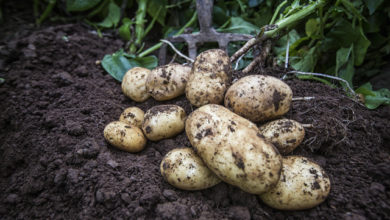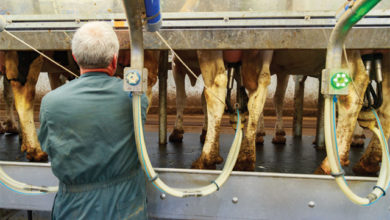Budget 2020: Implications for agriculture

The decision by the UK Chancellor Rishi Sunak MP to retain the duty relief on red diesel used for agricultural vehicles has been broadly welcomed as the most major implication of the 2020 Budget for agriculture in Northern Ireland.
The retention of relief was one of the main decisions taken in the Budget that will have a direct bearing on agriculture, including the fact that there will be no change in rates of Income Tax for sole traders or partners in a partnership and in the rate of Company Tax.
Discussing the impact of the recent budget announced by Chancellor Rishi Sunak, Omagh-based accountant Seamus McCaffrey outlines some of the main announcements in relation to agriculture.
As well as revealing that there will be no changes in rates of Income Tax for sole traders or partners and in the rate of Company Tax, the Chancellor also confirmed the entitlement of the agricultural industry to use red diesel.
On economic impact, including fallout from the COVID-19 pandemic, McCaffrey adds: “If farm businesses are adversely affected by the coronavirus, HMRC will waive payments, penalties and interest.
“Farm businesses can apply to HMRC for a tailored ‘Time to Pay’ arrangement but must obtain the agreement of HMRC in order to make this happen.”
McCaffrey also confirms that from 1 January 2021, there will be new entry and exit rules for the Agricultural Flat Rate Tax Payment Scheme.
“Farm businesses can join if annual turnover from farming is less than £150,000 but must leave when turnover exceeds £230,000,” he explains.
Other aspects to the Budget that will have a direct bearing on agriculture include the raising of the Structures and Buildings Allowance from 2 per cent to 3 per cent per annum. Meanwhile, the Annual Investment Allowance for qualifying expenditure on plant and machinery will be reduced from £1 million to £200,000 next year.
McCaffrey believes that the impact of the Budget will be generally positive for agriculture in Northern Ireland.
“The Chancellor did not touch Inheritance Tax or Capital Gains Tax. This possibility had been well profiled prior to the Budget. However, he could still look into these matters at some future date,” he says.
“The steps that will be taken by HMRC when it comes to dealing with the impact of coronaviruses on businesses will be extremely helpful. In addition, the decision taken by the Bank of England to reduce interest rates is to be welcomed.”
The Ulster Farmers’ Union (UFU) says the most crucial outcome from the Budget for farmers was the decision to retain the relief on red diesel.
Red diesel is the primary fuel for agriculture, running the majority of machinery throughout the UK. According to the UFU, changes to this duty could have virtually doubled fuel costs for farmers and with no current alternative fuel for agricultural vehicles, this would have left local agriculture immediately uncompetitive with many other countries who continue to provide lower fuel duty for their agricultural industries.
UFU President Ivor Ferguson says: “We are relieved that the Government has acknowledged the importance of red diesel relief for Northern Ireland farming businesses and food production. Alterations to red diesel relief would have increased expenses for our farmers at an already uncertain time causing serious financial implications.
“It would have added extra pressures on top of rising costs, falling incomes, weather problems and constant pressure on farmgate prices. Family farms would have been left in an uncompetitive position with many other countries who continue to provide lower fuel duty for their agricultural industries.
“The lower fuel duty recognises how much of a necessity red diesel is for the agricultural industry and the Government’s decision to maintain it will enable our farmers to continue producing high-quality produce for the country.

“Red diesel powers the majority of agricultural vehicles and is crucial for farm businesses and food production. The lower fuel duty recognises this reality. Farmers are facing into a period of massive uncertainty and rising costs. The last thing they need would be any moves by government that would drive up costs.”
Currently red diesel is taxed at 11.14p a litre compared to 57.95p a litre for standard diesel. The Chancellor used the 2020 Budget to confirm that the tax will end in two years’ time, although businesses working in agriculture, fishing, rail and heating industries will continue to be exempt for the foreseeable future.
Turning to the possible impact of COVID-19 on agriculture, Ivor Ferguson says that the UK economy will face temporary disruption, adding: “We are pleased that the Government has committed to assisting those who are self-employed, and small and medium businesses throughout these challenging times.
“This includes the pledge to cover statutory sick pay costs, providing business rates relief for many small businesses and mobilising bank lending for small and medium sized enterprises. All of these steps will help to provide resilience and support cash flow as businesses deal with the impact of the disease.”
Agriculture Minister Edwin Poots also welcomed the decision by the Chancellor to retain the duty relief on red diesel used for agricultural vehicles.
“I wrote to The Rt Hon Rishi Sunak MP earlier in March to impress upon him the difficulties that any reduction of the duty rate for diesel used for agricultural vehicles would have on Northern Ireland’s farming sector,” he explains.
“My Department estimates that it could have cost Northern Ireland famers up to £50 million per annum. The industry is already under severe financial pressure, with Total Income from Farming falling by 25 per cent to £290 million in 2019. Levying additional costs of this magnitude, on top of the uncertainties surrounding the UK’s exit from the EU and the current COVID-19 pandemic, would have been an absolute body blow.
“Therefore, I welcome the Chancellor’s decision to retain this vital duty relief on red diesel used for agricultural vehicles: it helps protect the industry which is at the very heart of the excellent local food we produce in Northern Ireland. It is vital to our regional economy, supports tourism, and contributes to the sustainability of rural areas and the environment.”
Ulster Unionist spokesperson on Agriculture, Environment and Rural Affairs Rosemary Barton MLA also welcomed the Chancellor’s announcement that agriculture will retain the use of lower duty red diesel.
“Rumours have been around in the past week that this Budget would spell the ending of the lower fuel duty diesel for use by farmers. I am pleased that while the Chancellor did announce an ending to the reduced fuel levy for many aspects in society after two years, the farming community, as well as domestic heating systems can continue to avail of the discounted toll.
“This is a common-sense, practical approach to the situation, but there is also a need for researchers and agricultural machinery manufacturers to continue work to find more efficient types of machinery and equipment.”





